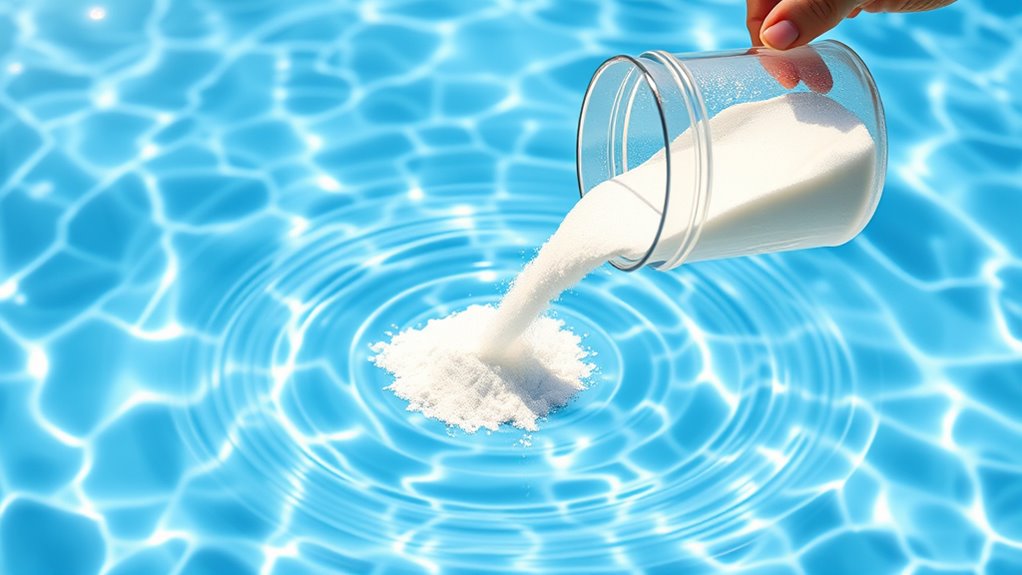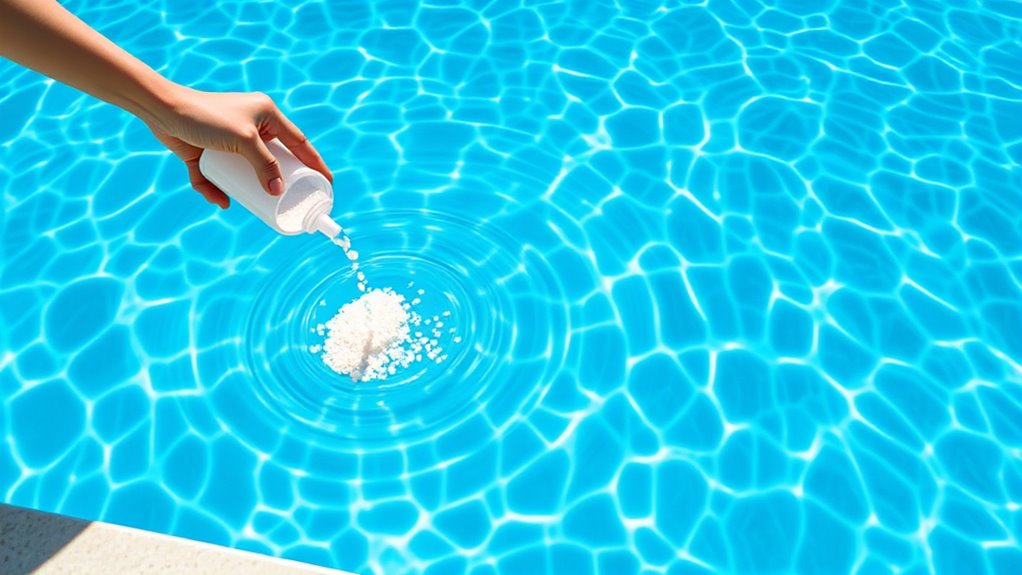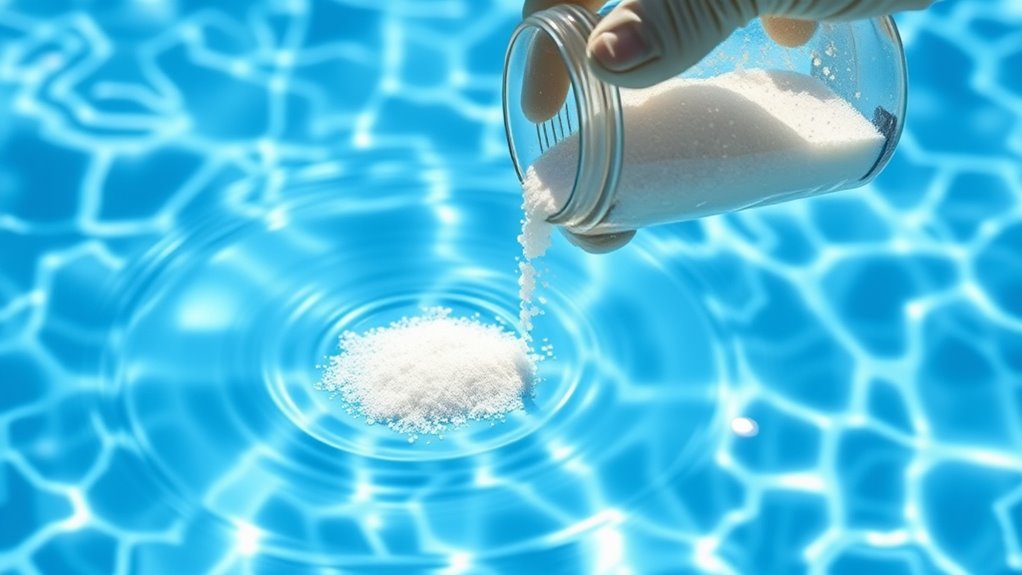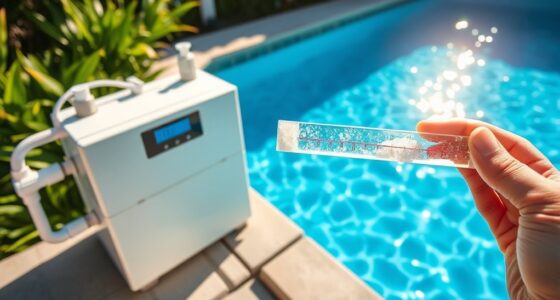Borates help stabilize your pool’s pH levels, prevent algae growth, and improve water clarity, making your swimming experience more comfortable. They create a thin layer on the water surface that reduces evaporation and heat loss while acting as a mild algae inhibitor. To add borates, you’ll need to test your water first, dissolve boric acid or borax, then evenly distribute it around the pool after balancing other chemicals. If you’re curious about how to keep these levels just right, keep going.
Key Takeaways
- Borates stabilize pH levels, reduce evaporation, and improve water clarity and softness.
- They inhibit algae growth and support sanitizer effectiveness for cleaner water.
- Proper addition involves dissolving borates in warm water and circulating the pool for even distribution.
- Maintain borate levels between 30-50 ppm for optimal water quality.
- Regular testing and gradual application prevent over-adding and chemical imbalance.
Understanding Borates and Their Role in Pools

Borates are chemical compounds derived from boron that can be added to pool water to improve its quality. When you add borates, they act as a stabilizer, helping to protect your pool’s chemical balance. Borates work by forming a thin layer on the water’s surface, which reduces evaporation and heat loss. They also help prevent algae growth and reduce the need for frequent sanitizer adjustments. By maintaining a stable environment, borates make it easier for you to keep your pool clear and inviting. They don’t replace your regular chemicals but complement them, creating a more balanced and manageable swimming environment. Understanding how borates function allows you to make smarter choices about pool maintenance and water quality.
How Borates Help Stabilize Ph Levels

By helping to maintain a stable chemical environment, borates play a key role in balancing pH levels in your pool. They act as a mild pH buffer, preventing sudden changes that can cause your water to become too acidic or alkaline. When pH swings occur, they can lead to corrosion of pool equipment or cloudy water, making maintenance more difficult. Borates work by absorbing excess hydrogen or hydroxide ions, which helps keep the pH within an ideal range of 7.2 to 7.6. This stabilization reduces the need for frequent pH adjustments and chemical additions. Additionally, water chemistry can be affected by fluctuating pH levels, impacting overall water quality. Maintaining proper water balance is essential for effective sanitation and swimmer comfort. As a result, your pool water remains clearer, safer, and more comfortable for swimming. Consistently balanced pH levels also improve the effectiveness of other pool chemicals you use. Additionally, innovative AI discoveries are transforming how we understand and manage water chemistry, leading to more efficient and effective pool maintenance solutions.
The Effect of Borates on Algae Prevention

Algae growth in your pool can quickly turn clear water into a murky, uninviting mess, but borates can help prevent this problem. Borates act as a mild algae inhibitor, making the environment less hospitable for algae to thrive. By maintaining a proper borate level, you reduce the chances of algae spores taking hold and spreading. Borates work alongside your sanitizer, boosting its effectiveness and slowing algae development. This means you won’t need to rely as heavily on chlorine or other chemicals, saving you time and effort. Consistently keeping borates in your pool creates a less favorable environment for algae growth, helping to keep your water clear, clean, and inviting all season long. Additionally, understanding Kia Tuning can help you maintain a balanced and harmonious environment, much like maintaining proper chemical levels in your pool.
Benefits of Using Borates for Skin and Eye Comfort

Using borates in your pool can considerably reduce eye irritation, making swimming more comfortable. You’ll also notice your skin feels softer and less dry after swimming. These benefits help create a more pleasant and inviting pool experience. Additionally, borates act as a water clarifier, helping to improve overall water quality and visibility. Incorporating borates can also support sustained water balance, reducing the need for frequent chemical adjustments and maintaining clearer water.
Reduced Eye Irritation
When borates are added to pool water, they help maintain a stable pH level, which reduces the likelihood of irritation to your eyes and skin. A balanced pH prevents harsh chemical reactions that cause burning or redness when you swim. Borates act as a pH buffer, minimizing fluctuations that can lead to discomfort. As a result, your eyes stay clearer, and your skin feels less dry and irritated after swimming. This stability also means you’re less likely to experience stinging sensations or redness caused by imbalanced water chemistry. By keeping the pH steady, borates create a more comfortable swimming environment, especially for those with sensitive eyes or skin. Overall, incorporating borates helps you enjoy your pool without the usual irritation.
Softer Skin Feel
Because borates help stabilize your pool’s pH and reduce harsh chemical reactions, your skin feels noticeably softer after swimming. When the water’s pH remains balanced, your skin isn’t exposed to the drying effects of chloramines and other aggressive chemicals. Borates act as a buffer, minimizing irritation and leaving your skin smoother and more comfortable. Without the harsh chemical reactions, you’re less likely to experience dryness or itchiness after your swim. This subtle but important benefit makes your pool experience more enjoyable and less abrasive on your skin. Additionally, softer skin feels more hydrated and less tight, encouraging you to swim more often without discomfort. Proper water chemistry management is essential for maintaining these benefits. Maintaining optimal chemical balance can also prevent issues that cause skin irritation. Regular testing helps ensure borates effectively support your pool’s overall water quality, leading to a healthier swimming environment. In addition, consistent maintenance ensures that borates continue to function effectively over time, preserving the benefits. Overall, adding borates can markedly improve your pool’s comfort level, making each swim a gentler, more pleasurable experience. Using the right pool chemicals can also support maintaining proper pH levels, further enhancing skin comfort.
Minimized Skin Dryness
By maintaining a balanced pH level in your pool, borates considerably reduce skin dryness and irritation. When the pH stays in the ideal range, your skin and eyes are less likely to become dry or itchy after swimming. Borates help stabilize the pH, preventing fluctuations that can lead to discomfort. With fewer pH swings, your skin retains moisture better, reducing the feeling of tightness or dryness. You’ll notice fewer red, itchy eyes, and your skin will feel softer and more comfortable. This creates a more pleasant swimming experience, especially for sensitive skin or frequent swimmers. Overall, using borates helps maintain a gentle, balanced environment, ensuring your skin stays hydrated and irritation-free even after extended pool use.
Determining When and If You Need to Add Borates

You’ll want to keep an eye out for signs your pool’s chemistry is off, like cloudy water or increased algae growth. Testing your water regularly helps you determine if borates are needed to restore balance. If levels are low, adding borates can improve water clarity and reduce maintenance issues. Proper borate levels also contribute to long-term water stability, making pool maintenance easier and more effective. Understanding the role of borates in pool chemistry can help you maintain a healthier and more enjoyable swimming environment. Incorporating knowledge about home organization can also help in keeping your pool area tidy and clutter-free, enhancing overall safety and enjoyment. Additionally, maintaining appropriate filtration and chemical balance supports the effectiveness of borates in your pool system.
Signs of Imbalance
Are your pool’s water conditions indicating a need for borates? Look for these signs of imbalance:
- Persistent algae growth despite regular chemical treatments
- Cloudy water that won’t clear with filtration alone
- Skin or eye irritation after swimming
If these issues occur, your water may lack the stabilizing and algae-preventing benefits of borates. Low borate levels can lead to increased algae growth and reduced water clarity. Additionally, if your water feels more prone to algae or feels rougher on your skin, it’s a sign to contemplate adding borates. Regularly monitoring these symptoms helps maintain a balanced, clear, and inviting pool. Using electric bikes or other energy-efficient tools can help reduce your pool’s environmental impact and energy costs. Addressing these signs early prevents more extensive treatments later, keeping your pool safer and more enjoyable. Incorporating water chemistry testing into your routine can further help detect subtle imbalances before they become major issues. Understanding how borates contribute to pool water chemistry can also guide you in maintaining optimal water quality over time.
Testing Water Levels
To determine if your pool needs borates, start by testing the water’s chemical levels regularly. Use a reliable test kit to check your pH, total alkalinity, and calcium hardness, as these impact borate effectiveness. Specifically, measure the borate level if your kit includes it, or use a dedicated borate test strip. Ideal borate levels range from 30 to 50 ppm. If your levels are below this, it’s time to consider adding borates. Keep in mind that consistent testing helps you maintain balanced water chemistry, preventing issues like algae growth or cloudy water. Regular testing also ensures you add borates only when needed, avoiding over-treatment. Monitoring these levels keeps your pool water clear, soft, and protected. Additionally, understanding water chemistry helps optimize borate benefits and maintain overall pool health. Proper circulation and filtration are also crucial for effective distribution of borates throughout the water.
Preparing Your Pool for Borate Addition

Before adding borates to your pool, it’s vital to make certain the water is properly balanced. This ensures the borates work effectively and don’t cause any issues. First, check your pH level; it should be between 7.2 and 7.6. Second, test alkalinity, aiming for 80-120 ppm, to stabilize pH. Third, verify calcium hardness; keep it between 200-400 ppm to prevent scaling or corrosion. Adjust these levels as needed before proceeding. Properly balanced water helps borates distribute evenly and maximize their benefits. Ignoring this step can lead to cloudy water, irritation, or ineffective borate treatment. Once your water chemistry falls within the ideal ranges, you’re ready to add borates confidently and enjoy their many benefits.
Step-by-Step Guide to Adding Borates to Your Pool

With your pool water chemistry properly balanced, you’re ready to add borates. First, measure your current borate level with test strips or a kit. If needed, calculate the amount of boric acid or borax required to reach the ideal 30-50 ppm level. Dissolve the borate compound in a bucket of warm water, stirring thoroughly. Pour the mixture evenly around the pool’s perimeter, avoiding splash or concentrated spots. It’s best to add borates during evening hours to reduce sunlight degradation. Allow the water to circulate for at least four hours, ensuring even distribution. Avoid swimming until the borates are fully integrated and levels stabilize. Following this step-by-step process ensures safe and effective borate addition, enhancing your pool’s water quality.
Monitoring and Maintaining Borate Levels

To keep your pool balanced, you need to regularly test your borate levels and know the recommended range. Maintaining the ideal borate level helps prevent algae growth and stabilizes pH. If levels fall outside the target range, you’ll need to adjust them to ensure your pool stays clean and healthy.
Testing Frequency Guidelines
Regular testing of your pool water’s borate levels is essential to keep your pool balanced and safe. Typically, you should test your borate levels:
- At least once every month during the swimming season to ensure consistent levels.
- After heavy rain or significant water dilution, as these events can alter borate concentrations.
- Whenever you notice water imbalance or cloudy water, to identify if borates need adjustment.
Using a reliable test kit, measure borates accurately. Consistent testing helps you maintain proper levels, reducing algae growth and chemical costs. Keep in mind that maintaining regular testing routines ensures your pool remains clean, healthy, and enjoyable all season long.
Optimal Borate Range
Maintaining borate levels within the ideal range guarantees your pool stays balanced and algae-free. The recommended borate range is typically between 50 and 100 ppm. Staying within this range helps stabilize pH, reduce chlorine consumption, and inhibit algae growth. Regular testing ensures you catch any drops below or rises above the target range. If levels are too low, algae can flourish, and pH may become unstable. If levels are too high, it could interfere with other chemical balances. You should monitor borate levels weekly, especially during peak usage or after chemical adjustments. Consistent maintenance of this range contributes to clearer water, less chemical use, and a more comfortable swimming experience. Keeping your borate levels within this ideal window is essential for effective pool management.
Adjusting Borate Levels
Because borate levels can fluctuate due to water dilution, chemical additions, or evaporation, actively monitoring these levels is essential for proper pool maintenance. If you find your borate levels are below the ideal range, you need to raise them. To do this:
- Test your current borate levels with a reliable test kit.
- Calculate how much boric acid or borate product you need based on your pool size.
- Carefully add the recommended amount, then circulate the water thoroughly.
Regular testing ensures you maintain the proper borate balance, which helps control algae and stabilize pH. Keep detailed records of your adjustments, and retest after each addition to avoid overcorrecting. Proper management keeps your pool water clean and balanced.
Common Mistakes to Avoid When Using Borates

One common mistake to avoid when using borates in your pool water is adding too much at once. Overdosing can disrupt water balance and cause cloudy water or other issues. To prevent this, always add borates gradually and test frequently. Here’s a quick guide on common pitfalls:
| Mistake | Consequence | How to Avoid |
|---|---|---|
| Adding too much at once | Cloudy water, imbalance | Add small amounts, test, adjust |
| Ignoring water testing | Incorrect levels, algae | Test regularly, monitor levels |
| Skipping proper mixing | Uneven distribution | Stir or circulate thoroughly |
| Not considering other chemicals | Imbalance, corrosiveness | Balance pH and alkalinity first |
| Using expired borates | Reduced effectiveness | Use fresh, high-quality products |
Tips for Long-Term Pool Water Balance With Borates

To guarantee your pool stays balanced over the long term with borates, consistent testing and adjustments are essential. Regularly check your water’s pH, alkalinity, and borate levels to prevent imbalances. Keep these tips in mind:
Consistently test and adjust pH, alkalinity, and borate levels to keep your pool balanced with borates.
- Test weekly to ensure borates stay around 30-50 ppm, adjusting if needed.
- Maintain pH between 7.2 and 7.6 to optimize borate effectiveness.
- Use appropriate stabilizers and sanitizers to support water clarity and minimize algae growth.
Frequently Asked Questions
How Often Should I Test My Pool’s Borate Levels?
You should test your pool’s borate levels at least once a month to guarantee they’re maintained properly. Regular testing helps you keep borate levels between 30-50 ppm, which stabilizes the water and reduces algae growth. After adding borates, wait a few days before testing again to get an accurate reading. Keep a consistent testing schedule to maintain ideal water quality and enjoy a cleaner, clearer pool.
Are Borates Safe for Children and Pets?
Did you know that borates are considered safe in pool water at recommended levels? You might worry about children and pets, but when used properly, borates help keep your pool clear and reduce algae growth without posing health risks. They’re harmless in small amounts, and many pool owners trust them for maintaining a safe environment. Just make sure you follow proper guidelines, and everyone can enjoy your pool safely.
Can Borates Be Used With All Types of Pool Sanitizers?
You can generally use borates with most pool sanitizers, but it’s best to check specific product instructions. Borates work well with chlorine and bromine, helping to stabilize pH and reduce algae growth. However, some sanitizers might react differently, so always follow manufacturer guidelines. Mixing borates with your sanitizer can enhance water clarity and softness, but avoid overuse to prevent imbalances that could affect sanitizer effectiveness.
What Is the Ideal Borate Concentration for Most Pools?
You want to know the ideal borate concentration for your pool. Typically, maintaining a borate level between 30 and 50 ppm is best. This range helps stabilize pH, reduces algae growth, and enhances water clarity. Keep in mind, regular testing guarantees you stay within this range. Adding borates is straightforward, and maintaining proper levels supports a healthier, more balanced pool environment.
Do Borates Affect Pool Water Evaporation Rates?
Did you know that a small change in evaporation rates can save you hundreds annually? Borates don’t directly affect evaporation, but they stabilize pH levels, which can influence evaporation indirectly. When pH remains balanced, water loss due to evaporation slows slightly, reducing chemical imbalance and algae growth. So, while borates don’t prevent water from evaporating, maintaining proper pH with borates can help keep your pool water more consistent and clean.
Conclusion
Adding borates to your pool acts like a gentle guardian, balancing your water and keeping algae at bay. With proper maintenance, they create a smooth, comfortable swimming experience and help your pool stay crystal clear. Just remember, like a loyal friend, they work best when monitored and maintained. Embrace the benefits, avoid common pitfalls, and enjoy a worry-free, sparkling pool season ahead—your oasis is just a few steps away.









